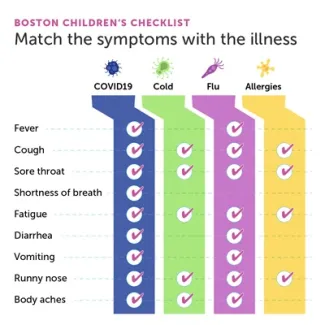Coronavirus | Vaccine Information
COVID-19 vaccination information for kids & teens
The U.S. Food and Drug Administration (FDA) has authorized the emergency use of the Pfizer BioNtech and Moderna vaccines to prevent COVID-19 in children 6 months and older. The FDA has authorized the Johnson & Johnson vaccine for people 18 and older. The Centers for Disease Control and Prevention (CDC) prefers that people get either a Moderna or Pfizer vaccination as a booster shot and recommend a Johnson & Johnson vaccine only in certain situations.
Who is eligible for a COVID-19 booster?
COVID-19 vaccine boosters can enhance or restore protection that might have diminished over time after your primary series vaccination.
Educating kids about the COVID-19 vaccine
Coronavirus | Your Visit
Prepare for your visit to Boston Children's
Masks
Effective Friday, May 12, Boston Children's Hospital will no longer require masks at any of our locations, including our Longwood campus. Masks will still be available at all entrances, and if you feel more comfortable wearing one, you are welcome to do so. Additionally, if you or any member of your group has respiratory symptoms, we do ask that you wear masks while visiting Boston Children’s. If you prefer to interact with our staff while they are masked, please don’t hesitate to ask — our entire team wants you and your family to feel as comfortable as possible, and we will mask up if you ask.
Cleaning
Our cleaning practices are incorporate recommended guidelines by the Centers for Disease Control and Prevention (CDC). All surfaces are being regularly cleaned and we continue to provide hand sanitizer throughout our locations.
Visitor policy
The visitor policy as returned to pre-COVID protocols. Learn more about our visitor policy.
Coronavirus | Parenting Resources
Parenting during the coronavirus pandemic
Insight, advice, and tips for talking about COVID-19 with your kids and helping your whole family cope during these uncertain times.
School-aged children
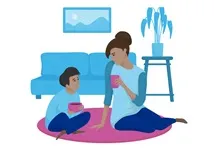
Teens and young adults

Coronavirus | Community Resources
Boston Children’s Hospital is committed to improving the health and well-being of children and families in our community. We know that the COVID-19 crisis has caused parents and caregivers to face unprecedented levels of stress in their everyday lives. Many families continue to struggle with food insecurity, are worried about paying their rent or mortgage, have concerns about sending their child to daycare, or how to work with a child learning from home.
Food access and resources
Unfortunately, the COVID pandemic has led to more food insecurity for families throughout Massachusetts. It also has disproportionately impacted those living in low-income areas and the Black and Latino communities.
Boston Children’s is supporting its community partners and Boston community health centers to help families with food access, as well as with other needs around rental and utility assistance, and other basic household supplies.
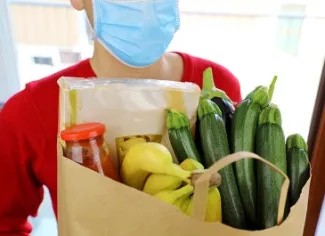
Massachusetts state resources
- Project Bread FoodSource Hotline
- Project Bread and the Department of Elementary and Secondary Education (DESE)
- FoodPantries.org
- Department of Transitional Assistance (DTA)
- Women, Infants, and Children Nutrition Program (WIC)
Greater Boston resources
Resources in Western Massachusetts
Childcare and school resources
Boston Children’s Office of Community Health launched the Boston Childcare Support Initiative in July 2020 to support childcare providers in the communities most impacted by COVID. In total, 130 childcare providers have received grants. The grant amounts ranged from $3,500 to $10,000. These funds will be used by childcare providers to follow public health guidelines, adapt physical spaces, and cover increased costs for staff, overhead, personal protective equipment, and cleaning supplies.
We hope these funds will help childcare providers recover, as they are essential small businesses, providing a critical service for many families in our community. Read more about how Boston Children’s is supporting childcare providers during COVID.
Read more about how Boston Children’s is supporting childcare providers during COVID.
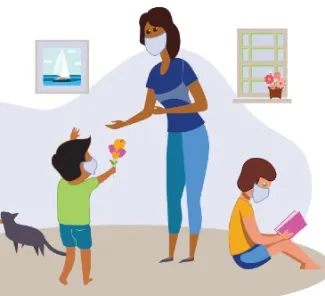
For Boston Public School parents, be sure to check out for regular updates and information at bostonpublicschools.org/weeklyupdate.
Housing resources in Massachusetts
- For the most up-to-date information for renters, homeowners, and landlords visit, mass.gov/covid-19-getting-help-with-housing-costs
- More on tenants’ rights can be found at mass.gov/info-details/tenant-rights and details on eviction at mass.gov/guides/tenants-guide-to-eviction
Children and families who are homeless or have housing insecurity can be at increased risk of becoming sick with COVID-19.
Learn more about the link between COVID-19 and homelessness.
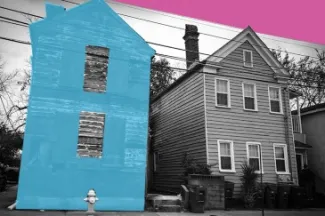
Financial assistance for broadband internet
The Federal Communications Commission has launched a temporary program to help families and households struggling to afford Internet service during the COVID-19 pandemic. The Emergency Broadband Benefit provides a discount of up to $50 per month toward broadband service for eligible households and up to $75 per month for households on qualifying Tribal lands. Eligible households can also receive a one-time discount of up to $100 to purchase a laptop, desktop computer, or tablet from participating providers.
Eligible households can enroll through a participating broadband provider or directly with the Universal Service Administrative Company (USAC) using an online or mail in application.
You can learn more about the benefit, including eligibility and enrollment information, by visiting fcc.gov/broadbandbenefit, or by calling 833-511-0311.
Government updates
Boston Children’s Hospital is committed to providing the highest quality of care under any circumstance. The COVID-19 outbreak has made it more important than ever for us to serve our communities through this unprecedented health crisis together. As the situation continues to evolve, our offices are tracking legislative and regulatory actions related to health care access, behavioral health, and community health. We also are in close contact with all of our partners including city agencies, community health centers, community-based organizations, and the Boston Public Schools to assess the needs, resources, and gaps in services so that Boston Children's can best assist and support our community as needed.
If you have questions or concerns about evolving government policies, please reach out to the Office of Government Relations at CAN@childrens.harvard.edu and sign up for updates through the Children's Advocacy Network.
Coronavirus | Research
Boston Children’s remains at the forefront of research and innovation during the COVID-19 pandemic. Learn about our recent advances.
Spatial modeling of vaccine ‘deserts’ as barriers to controlling COVID-19
Analysis of a website called VaccineFinder shows that in 2021, more than 10 percent of U.S. residents had poor access to COVID-19 vaccines. Vaccines were less available to people in rural areas, people of color, and people with chronic illnesses.
Powerful new antibody neutralizes all known coronavirus variants
As COVID-19 wears on, new variants have found ways to evade our antibody responses, leading to breakthrough cases. Now, Boston Children’s researchers have made antibodies that neutralize all strains of the virus, including all Omicron variants known at the time.
How protected am I from COVID-19? A new test could tell you at home
Say you’re going to a wedding or are about to travel. You’ve been vaccinated against COVID-19, but you have an underlying medical condition. How protected is your family? Do you need another booster? A new home test could give answers within 15 minutes.
Lingering health problems in children and youth after COVID-19 and MIS-C
More than 1 in 4 children and adolescents hospitalized with COVID-19 or MIS-C early in the pandemic were still not well up to four months later, and 15 to 20 percent had not resumed their previous activity, this national study finds.
Previous COVID-19 or MIS-C does not protect kids from Omicron
Unvaccinated children and teens remain susceptible to the coronavirus, especially the Omicron variant, a national study finds.
COVID-19’s devastating toll: An increase in adolescent suicides and mental health crises
Two studies from Boston Children’s Hospital show that the trend of increased self-harm, suicidal ideation, and suicide attempts by teens became even more acute with the onset of COVID-19.
How COVID-19 triggers massive inflammation
The SARS-CoV-2 virus infects and kills critical immune cells in the blood and lungs, which set off powerful alarm bells as they die, according to a study.
A new symptom of COVID-19 in young children: Croup
During the Omicron surge, pediatricians and emergency departments began noticing a trend.
Pregnant mothers who get COVID-19 vaccines are also protecting their babies
Research co-led by Dr. Adrienne Randolph and the CDC estimates that vaccinating expectant moms reduced the chances their babies would be hospitalized with severe COVID-19 by 60 percent. Dr. Randolph explains in a Q&A.
Joining the fight against COVID: Women scientists at Boston Children’s are leading the way
When COVID-19 hit, these physician-scientists at Boston Children’s pivoted to studying the new coronavirus and its effects. Here, they share their paths and offer their advice on going into science.
A respiratory model of COVID-19, made from patients’ own cells
An engineered airway lining, made from patients’ own cells, is helping scientists understand how COVID-19 affects the respiratory tract, and can be used to test potential drugs.
COVID-19 vaccination in 12- to 18-year-olds: What does the science say?
Drs. Jane Newburger and Adrienne Randolph led three major studies that confirm vaccination’s protective benefits against both COVID-19 and MIS-C, which far outweigh rare side effects.
Contact phone
From our labs and clinics: The top 10 COVID-19 science stories of 2021
In 2021, researchers in all corners of Boston Children’s documented the clinical and immunological effects of COVID-19 and investigated new vaccines, diagnostics, and therapeutics.
Emerging protein-based COVID-19 vaccines could be game-changing
Two separate programs at Boston Children’s have developed protein-based COVID-19 vaccines that could be cheaper and easier to store than mRNA vaccines.
What makes the Delta variant of COVID-19 so contagious?
A structural analysis shows that Delta’s spike protein is especially good at fusion, allowing the virus to enter people’s cells very rapidly.
Unpacking the body’s interferon response to COVID-19
Are interferons helpful or harmful in COVID-19? This detailed study finds that it depends which interferons, when they’re produced, and where.
Rapid saliva test detects COVID-19 variants, at home or point of care
A low-cost test system, designed by Dr. Rose Lee and collaborators at the Wyss Institute, can give a readout from users’ spit within about an hour. The researchers hope to see it made available commercially.
Why do some people get severe COVID-19? The nose may know
The body’s first encounter with SARS-CoV-2 happens in the nose and throat. Responses in this early battleground help determine who will develop severe COVID-19 and who won’t.
Children with severe MIS-C do better with IVIG and steroids as initial therapy
Children given the combined treatment up front had better cardiovascular outcomes, finds a large study in The New England Journal of Medicine.
A coming wave of diabetes? The link with COVID-19
Many patients hospitalized with COVID-19 early in the pandemic developed hyperglycemia, or abnormally high blood sugar levels.
What drives severe lung inflammation in COVID-19?
A new study finds that excess Notch4 protein on regulatory T-cells leads to severe lung inflammation in COVID-19.
COVID-19 takes its toll on kids’ mental health
Child hospitalizations for self-harm and suicide attempts stayed steady in 2020, even as hospitalizations for almost all other reasons fell by about half compared with 2017-2019.
New findings show risk of bleeding and clotting after COVID-19
Some patients with congenital heart disease and COVID-19 develop a tendency for blood clots or bleeding issues, even if they had minor COVID-19 symptoms.
Sturdier spikes may explain SARS-CoV-2 variants’ faster spread
Why do the new COVID-19 variant strains spread so quickly? Research by Dr. Bing Chen finds that a mutation carried by the U.K., South Africa, and Brazil strains strengthens the coronavirus spike, rendering the virus better able to infect us.
Neurological involvement common in kids and teens with acute COVID-19 and MIS-C
About 1 in 5 hospitalized patients had neurologic involvement, mainly fatigue, headache, confusion, trouble walking/crawling, and loss of taste/smell. Of these, 1 in 8 developed serious conditions such as stroke, encephalitis, and Guillain-Barre syndrome.
If another pandemic hits, our online ‘footprints’ may help the experts
Looking back at the early days of COVID-19, two Boston Children’s studies demonstrate the potential predictive value of tracking the public’s digital activity (and that of healthcare professionals) in guessing the enemy’s next moves.
Is it MIS-C or severe COVID-19? An update on multisystem inflammatory syndrome in children
Funded by the CDC, this national study led by Dr. Adrienne Randolph compared and contrasted MIS-C with severe, acute COVID-19 in more than 1,100 children. While the two conditions share some features, there are also important differences.
How do patients with cystic fibrosis respond to COVID-19? An ‘airway in a dish’ may give answers
Few COVID-19 cases have been noted in patients with cystic fibrosis. Are they protected, or just practicing good social distancing? This study is using an airway lining, engineered from patient-derived cells, to model the effects of SARS-CoV-2 in CF and test possible treatments.
How does the placenta protect unborn babies from COVID-19?
Being pregnant is a risk factor for severe COVID-19 in women who are exposed. Yet only 5% of their babies are born with the infection, and nearly all are doing very well. Dr. Elizabeth Taglauer is studying the placenta to see how it may be protecting babies.
Capturing SARS-CoV-2’s shape-shifting spike protein
The SARS-CoV-2 spike protein, the one our antibodies target, has two forms. New work provides a snapshot of both, with implications for COVID vaccines.
Type III interferon in COVID-19: Protective or harmful?
At least two clinical trials are testing type III interferon in COVID-19 to fight viral infection and limit inflammatory damage. But a new study led by Dr. Ivan Zanoni at Boston Children’s warns that if it’s given later in the illness, it could increase susceptibility to bacterial “superinfection."
Disulfiram inhibits inflammatory gatekeeper protein: Could it be helpful in COVID-19?
Inflammation is the alarm system by which cells first respond to potential danger. But in excess, inflammation can be deadly.
Making an IMPACC: Examining immune responses in people hospitalized with COVID-19
Boston Children’s Hospital will play key roles in the IMPACC study examining the body's immune response over time in patients hospitalized with COVID-19.
How the new coronavirus gets into respiratory tissue — and may exploit one of our defenses
What makes SARS-CoV-2 such a threat? A study suggests that it may exploit one of our main defenses against viruses to infect three specific cell types.
Boston Children’s Hospital to lead nationwide study on COVID-19 in children
A nationwide CDC-funded study of COVID-19 in children is asking why children are largely spared, and why a tiny handful become very ill with the virus.
Coronavirus | Provider Resources
Returning to Boston Children’s: Information for Providers
While the changes brought on by COVID-19 will be with us for some time to come, one thing will never change: Our commitment to providing the highest quality care.
Primary care clinicians—often the first point of contact for patients and families concerned about their children—are the cornerstone of that commitment. From routine wellness checks and vaccinations to uncertain and potentially complex diagnoses, patients and families look to you for guidance and expertise. Your role in this pandemic and the future of pediatric healthcare delivery is essential. We value your partnership as we work together to keep children and families healthy.
While the road ahead is uncertain, we’re in this together. We look forward to continue working with you.
Referring patients to Boston Children’s during the COVID-19 pandemic
Boston Children’s continues to work closely with state and local officials to ensure the highest standard of safety for our patients, families, clinicians, and staff.
If you believe that a patient would benefit from receiving services from Boston Children’s, then you should refer that patient.
We are open and providing urgent, emergent, and medically necessary in-person care for patients during the COVID-19 outbreak. Depending on your patient’s needs, we may schedule a virtual visit. We have found virtual visits to be a safe and effective way to provide consultations and follow-up care that do not require providers to see patients face to face. In addition, our experts remain available for requests for second opinions. Please use standard operating procedures when referring patients to Boston Children’s. If you need more information regarding referring patients, please contact us for scheduling information.
Please be aware that all visits at Boston Children’s are currently by appointment only. We cannot accept walk-in visits, even for blood draws or radiology. Please contact us for scheduling information.
Testing resources
For the latest guidance on who should get tested, and whether or not testing will be covered by your insurance, please visit mass.gov for more information.
When does a patient require COVID-19 testing?
The Commonwealth of Massachusetts recommends testing for anyone with COVID-19 symptoms and any individual who has had close contact a person with confirmed COVID-19 infection.
A person is considered a close contact if:
- They were less than 6 feet from a person with confirmed COVID-19 for at least 10-15 minutes while the person was symptomatic or within the 48 hours before symptom onset
- They had direct contact with infectious secretions of a person with confirmed COVID-19 while not wearing recommended personal protective equipment (e.g., gown, gloves, facemask, eye protection)
- Testing sites in Massachusetts: COVID-19 Test Site Locator
- How to obtain a nasopharyngeal swab specimen: Video and step-by-step instructions
- How to update testing site information (for use by testing sites): Pediatric Testing Site Information
- My Hospital Testing Story: Drive-through swab, Boston Children’s Family Education
- My Hospital Testing Story: Throat swab, Boston Children’s Family Education
- My Hospital Testing Story: Nasal swab, Boston Children’s Family Education
Centers for Disease Control and Prevention: Get the Facts About Coronavirus
Massachusetts Department of Public Health: COVID-19 Updates and Information

